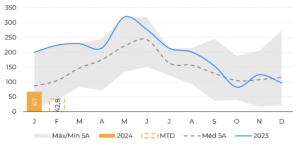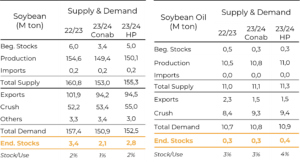Biodiesel blend increases to 14% in Brazil: what does this mean?
Brazil’s Biodiesel blend percentage has increased from 12% to 14%. Understand the possible impacts on the commodity market.
Since March of this year, the percentage of biodiesel blended in Brazil has increased from 12% to 14%. Produced from renewable sources such as vegetable oils and animal fats, biodiesel is a growing alternative to diversify the energy matrix.
The fuel is mainly used in road freight vehicles, such as trucks, buses, and vans. The decision to bring forward the increase in the biodiesel blend in December 2023 by the National Energy Policy Council (CNPE). Previously, it was estimated that this mark would only be reached in 2025.
The measure could impact energy market participants. Want to know how? Read on as we explain more details.
What are the objectives of increasing the biodiesel blend?
The increase in the biodiesel blend in diesel sold is expected to avoid the emission of 5 million tons of CO2 into the atmosphere. In addition, the federal government stipulates a reduction of approximately R$7.2 billion spent on importing fossil diesel. B15, the 15% blend previously planned for 2026, has also been brought forward to March next year.
The growth of biodiesel’s share in the matrix also aims to stimulate Brazilian agriculture and innovation, fostering job creation and sustainability. Demand for biodiesel is expected to grow and provide 14,000 new jobs by 2024.
The measure aims to reduce the idle capacity of installed plants by up to 18%. It also promotes energy security through the production of 2.4 billion liters of diesel. To this end, the CNPE approved the temporary suspension of biodiesel imports.
A Working Group was also created to prepare a Regulatory Impact Analysis (RIA). The objective is to protect consumer interests in relation to the quality and supply of domestic biodiesel and to promote competitiveness in the international market.
According to the Ministry of Mines and Energy, demand for commodities, especially soybeans, is expected to increase by about 6 million tons by 2025.
More information:
- International Biodiesel Day: what is it and how did it come about?
What does the increase in the biodiesel blend mean for the commodity market?
We have explained in two points what could be the main effects on the commodity market because of the increase in the biodiesel blend. Check them out below.
● Soybean oil supply and demand balance sheet
With the increase in domestic demand and the decrease in soybean production, it is necessary to analyze how the balance of this commodity oil, used to manufacture biodiesel, will look.
Soybean oil consumption is expected to grow by about 1 million tons due to the B14 mandate. This would imply an increase of 5.5 million tons in soybean crush. However, in 2023, Brazil exported a significant volume of the product due to crop failure in Argentina.
This year, with the prospect of better production in the neighboring country, the Brazilian nation should export less oil. In other words, it will offset part of the increase in domestic consumption. Taking this factor into account, the necessary growth in crushing drops to about 2 million tons.
Soybean oil – balance in million tons.

Source: Hedgepoint, Abiove, ANP
Soybean oil Brazil – Exports (thousands of tons)

Source: Hedgepoint, MDIC. MTD = Mês até o momento
● Increasing the mandate: supporting factor
We conclude that the mandate increase is not necessarily a bullish factor, but rather a supportive one. In other words, the difference is subtle. Therefore, higher demand tends to support oil and soybean prices.
However, with the current outlook in Brazil and Argentina, the increase may not be enough to reverse the downward price trend. If production estimates change for both countries and decrease significantly, the reality could change.
Soybean and soybean oil supply and demand

Source: Conab, Hedgepoint
In mid-February, the biodiesel market experienced its first price increase. Data from the National Agency of Petroleum, Natural Gas and Biofuels (ANP) show a small increase of 0.32% in the average price of biodiesel in Brazil.
The justification is lower supply, with mills resorting to early sourcing due to the entry into force of B14. In this scenario, the availability of physical biodiesel may be more restricted than usual, when the blend was 12%.
In the last weeks of March, prices also rose. According to an ANP survey, between March 18 and 24, factories adjusted the prices charged to distributors by more than 4.38%. This is the second largest increase in the product since the market has been operating under a contract system.
Read also:
- Ethanol market outlook for Brazil
Hedgepoint follows biodiesel market movements
Being aware of the movements of the biodiesel market makes a difference when making decisions in this sector. At Hedgepoint, we have a market intelligence team that follows and studies relevant developments.
In this way, we help our partners understand local and global movements and how they can affect their markets. After all, volatility is inherent to anyone who trades agricultural and energy commodities. That’s why it’s essential to manage risk to protect against price fluctuations.
By analyzing up-to-date data and reports, we can turn risks into opportunities. From a multidisciplinary team with a deep understanding of commodity market dynamics, we offer sophisticated hedging products.
In our educational platform, called Hedgepoint HUB, we provide educational materials for different levels of knowledge in this market. Try 1 month of Hedgepoint HUB for free and discover how we can help your business!
This document has been prepared by Hedgepoint Global Markets LLC and its affiliates (“HPGM”) solely for informational and instructional purposes, without the purpose of instituting obligations or commitments to third parties, nor is it intended to promote an offer, or solicitation of an offer of sale or purchase relating to any securities, commodities interests or investment products. Hedgepoint Commodities LLC (“HPC”), a wholly owned entity of HPGM, is an Introducing Broker and a registered member of the National Futures Association. The trading of commodities interests such as futures, options, and swaps involves substantial risk of loss and may not be suitable for all investors. Past performance is not necessarily indicative of future results. Customers should rely on their own independent judgment and outside advisors before entering any transaction that is introduced by the firm. HPGM and its associates expressly disclaim any use of the information contained herein that directly or indirectly results in damages or damages of any kind. In case of questions not resolved by the first instance of customer contact (client.services@hedgepointglobal.com), please contact our internal ombudsman channel (ombudsman@hedgepointglobal.com) or 0800-878 8408/ouvidoria@hedgepointglobal.com (only for customers in Brazil).






